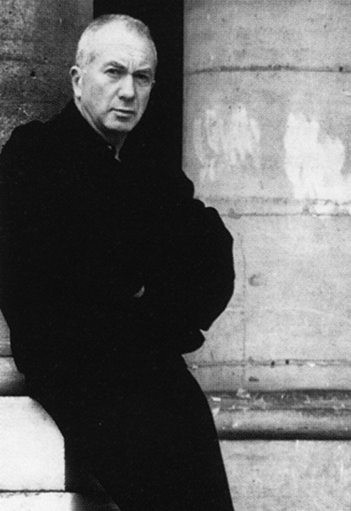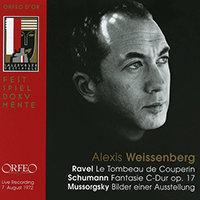Alexis Weissenberg
Alexis Weissenberg’s mother was a pianist who raised her only child alone. It was she who gave Weissenberg his first piano lessons, and at the age of five he began lessons with Pantcho Vladigerov. During 1944 Weissenberg and his mother spent three months in a prison camp, but made their escape to Israel via Turkey. In Jerusalem he studied with Professor Schröder, a disciple of Schnabel, and at fourteen he played Beethoven’s Piano Concerto No. 3 Op. 37 with the Jerusalem Radio Orchestra. He then studied piano with Busoni pupil Leo Kestenberg in Tel Aviv, often performing with the Palestine Symphony Orchestra. At fifteen Weissenberg toured South Africa with four different recital programmes and five piano concertos. Then at the age of seventeen he travelled to America, where he approached Artur Schnabel. He received a few lessons from Schnabel and Wanda Landowska, but enrolled at the Juilliard School of Music in New York where his piano teacher was Olga Samaroff. For composition and music theory he studied with Philadelphia-born composer Vincent Persichetti. However, Weissenberg was not at Juilliard for very long. His career started quickly with his winning an award sponsored by the Philadelphia Orchestra with whom he played Rachmaninov’s Piano Concerto No. 3 in D minor Op. 30 under Eugene Ormandy. After winning the Leventritt Award, Weissenberg played Chopin’s Piano Concerto No. 1 in E minor Op. 11 with the New York Philharmonic Orchestra and George Szell. He made extensive tours of South and Central America followed by his recital debut in New York at Town Hall in October 1948.
After such an auspicious start, Weissenberg became increasingly disillusioned with playing concerts. Invitations from orchestras became less frequent, and he found himself playing less prestigious dates in small towns. This was due in part to adverse reviews, partly to repeated repertoire and also to management problems. He played in London in 1950 at Covent Garden. Of his performance of Liszt’s Piano Sonata in B minor one critic wrote, ‘…he cannot, at twenty years old, hope to have acquired maturity’s intellectual power and calmness, though he brought neatness and sensitivity to Haydn and Schumann.’ Weissenberg left America for Paris in 1957 and spent the next ten years studying scores, teaching, and expanding his knowledge of music and literature, playing a few concerts a year. One of those was described as his ‘London debut’ in 1962. Of a performance of Bach’s Concerto in D minor and Mozart’s Piano Concerto in A major K. 488 a critic in The Times wrote, ‘The outstanding virtue of this young artist was his delicacy; sometimes his light, limpid tone and transparent texture even evoked memories of the kind of sounds Gieseking used to make.’ That flattering remark was leavened with the observation that he was ‘…too addicted to fast tempos’.
Having become a naturalized French citizen, Weissenberg got his career back on track when in 1966 conductor Herbert von Karajan invited him to play with the Berlin Philharmonic Orchestra. The following year he replaced an indisposed Arturo Benedetti Michelangeli playing Rachmaninov’s Piano Concerto No. 3 in D minor Op. 30 with the New York Philharmonic Orchestra. From that moment his career was re-launched and he has played throughout Europe, the United States and Japan.
Weissenberg’s repertoire is basically Romantic: Schumann, Chopin and Rachmaninov are the main fare with Bach, Haydn, Beethoven, Stravinsky and French composers also being included. In the early 1960s he gave performances of the six partitas by Bach (over two evenings) and the ‘Goldberg’ Variations BWV 988. Throughout his career Weissenberg has received mixed reviews. Nearly every critic is impressed by his technique, but not by his interpretative insights. It would appear that Weissenberg is a player with a strong technique, who does not often get beneath the notes and find the musical depths of the work he is performing. He seems sometimes to be fighting to take control of the music, and this can be explained by a comment he made: ‘I am basically an aggressive person, and I could not behave otherwise toward an instrument that I try to possess.’ Since the early 1990s Weissenberg has taught master-classes at the Engelberg monastery near Lucerne.
It was in Paris in 1950 that Weissenberg made his first recording, for Lumen. The music was Liszt’s Piano Sonata in B minor and Czerny’s La Ricordanza. From the mid 1960s he recorded for EMI in France and set down his interpretations of the music for piano and orchestra by Chopin, as well as his complete nocturnes which The Gramophone found ‘frustratingly perverse’. Often in Weissenberg’s recordings one can hear something wonderful, but then something irritating within the same work. From the same period come Weissenberg’s recordings of Bach’s complete partitas, Italian Concerto BWV 971, Chromatic Fantasy and Fugue BWV 903 and French Overture. He recorded the ‘Goldberg’ Variations again in 1981, but the earlier version is preferable for its more agreeable sound quality and air of joyousness. He recorded Liszt’s Piano Sonata again in 1967 plus Harold Bauer’s arrangement of César Franck’s Prélude, Fugue et Variations Op. 18. From the 1970s come recordings of Ravel’s Piano Concerto in G, his Tombeau de Couperin and Valses nobles et sentimentales. Also from the 1970s come Weissenberg’s recordings with conductor Herbert von Karajan. Tchaikovsky’s Piano Concerto No. 1 in B flat minor Op. 23 and Rachmaninov’s Piano Concerto No. 2 in C minor Op. 18 both receive bloated performances, but this may be due to the conductor. César Franck’s Variations Symphoniques are sensitively played, but the complete piano concertos by Beethoven are somewhat unsatisfying when taken as a whole. Weissenberg’s best concerto recording is with Riccardo Muti and the Philadelphia Orchestra and is of the Piano Concerto No. 1 in D minor Op. 15 by Brahms. Recorded in 1984, it is an heroic struggle that suits Weissenberg perfectly, and he is excellently matched by Muti and the Philadelphia Orchestra.
Also impressive is the recording of Rachmaninov’s Piano Concerto No. 3 in D minor Op. 30 with the Chicago Symphony Orchestra and Georges Prêtre, made in Chicago in 1967 for RCA. The late 1960s also saw Weissenberg recording a critically acclaimed version of Rachmaninov’s complete préludes for RCA and Bartók’s Piano Concerto No. 2 with the Philadelphia Orchestra and Eugene Ormandy.
In the late 1980s Weissenberg recorded for Deutsche Grammophon. A disc of Scarlatti sonatas received high praise while a disc of Debussy has some good things in it, especially in the quieter poetic moments. A Bach disc of Partitas Nos 4 and 6 plus the Italian Concerto in no way surpasses his earlier recording for EMI and a disc of both piano sonatas by Rachmaninov sounds tense and, at times, harsh and uncompromising. An early 1980s live recording from Italian Radio on the Ermitage label has excellent accounts of the Partita No. 4 in D major BWV 828 and Schumann’s Études Symphoniques Op. 13.
The best representation of Weissenberg is a four-disc set of recordings chosen by the pianist himself which was issued in 2004 by EMI France. Highlights include the concertos by Brahms, Ravel and Rachmaninov mentioned above plus the Piano Sonata by Liszt and Stravinsky’s Three movements from Petrushka recorded in 1964.
© Naxos Rights International Ltd. — Jonathan Summers (A–Z of Pianists, Naxos 8.558107–10).

















